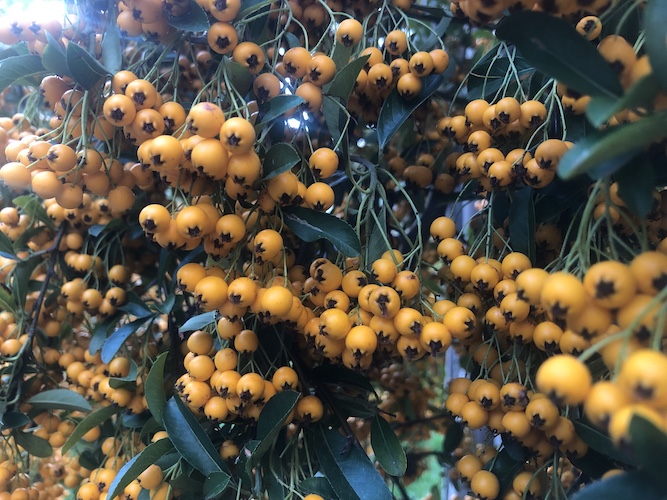Through the mist she saw a fox hurry along the top of her garden wall. The berries were as abundant as she had ever known, an ochre cascade to feed the migrant birds.
She’d lived alone, now, for 20 years and a guilty part of her knew her empty nest was much too large. The thought of leaving pained her, though: she liked her local friends, fellow veterans of struggles without end; she loathed the thought of anywhere shiny and new.
Only rarely did she consider boxing up her Doris Lessing collection, stacking her pots plants on the back seat of her Clio Hybrid and tootling up the Archway Road and beyond for an extended stay in the potential granny flat at her daughter’s spacious place in Baldock, just to see how it might be.
And now, right now, she was energised, excited, enthused.
She’d seen the poster in her local secondhand bookshop, next to the ones about complicity, betrayal and austerity 2.0. She didn’t know what purpose was served by the decimal point in that last one, and didn’t like to ask. But she approved of the sentiment. That was key.
The poster was for a meeting of supporters of Our Party. This had no leader, no policies and, indeed, did not exist. None of that mattered to Dottie Trott. What mattered was that it took her back.
It took her back to 1968 and marching to Grosvenor Square.
It took her back to 1977 and mustering at New Cross.
It took her back to 1982 and fasting for Malvinas peace.
It took her back to 1990 and riots in Trafalgar Square.
It took her back to 2003 and marching to Hyde Park.
It took her back to 2017 when victory came so near.
Dottie spotted a squirrel. A pigeon. Her cat. Birds sang in nearby trees. Dew sparkled on a spider’s web. She had never imagined, when finding a room in a squat in Mildmay Grove in the days of Hippydilly and International Times, that one day, a whole train line would be called Mildmay or that she would buy a house nearby that ended up being worth £2 million.
Who might be at the Our Party gathering? Dottie made herself a peppermint tea and found the meeting posted on Facebook (of which she disapproved, but what could you do?).
There were comments by people she knew, including some of the same vintage – people who, like Dottie, could remember the old days, when Islington was cheap and cheerful and its middle-class people, of whom Dottie was one, were bohemian, alternative and not rich. Not really. Not actually.
Dottie felt things had changed for the worse: the radical bookshops had gone and the bankers had moved in, although, admittedly, the artisan bread shop was lovely, as was vegan café and, of course, the bicycle lanes.
Such things were worth fighting for, Dottie thought – defending against the greedy corporates, along with all that gentrification. She looked ahead to many meetings, speeches and elections to sub-committees. Yes, Our Party was the one for her.
John Vane’s London novel Frightgeist can be bought here.
OnLondon.co.uk provides unique coverage of the capital’s politics, development and culture with no paywall and no ads. Nearly all its income comes from individual supporters. For £5 a month or £50 a year they receive in-depth newsletters and London event offers. Pay via any Donate link on the website or by becoming a paying subscriber to publisher and editor Dave Hill’s Substack.


Which pretty sums up for me why OnLondon is not for me.